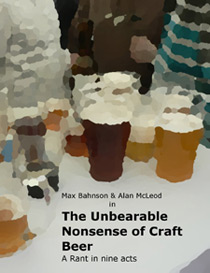BOOK REVIEW: “The Unbearable Nonsense of Craft Beer”
Is the “craft beer movement” a social movement, a political movement, an aesthetic movement, any sort of movement?
Tom Acitelli uses the term, or simply the movement, on more than a third of the pages in “The Audacity of Hops.” He does not categorize this movement, and that probably illustrates how the words “craft beer movement” have become an entity unto themselves. Only a couple of months ago, the Detroit Free Press suggested “Pride, personal experience help define the craft-beer movement” without explaining what makes it a movement.
Within the context of “The Audacity of Hops” the implication would be that Acitelli is discussing a social movement. The publisher states, “This book not only tells the stories of the major figures and businesses within the movement, but is also ties in the movement with larger American culinary developments.” And Acitelli certainly links craft beer and Slow Food, often itself described as a movement and even defined by Wikipedia as a social movement.
(The lengthy Wikipedia list also includes the civil rights movement, right to life, Tea Party movement, Ku Klux Klan, and Health at Every Size. In the end, what constitutes a “social movement” is less clear than finding a definition for “craft beer” and we know what folly that is. Academics have laid entire forests to waste simply theorizing on the life cycles of social movements. If there is such a thing as a craft beer movement, social or not, it would be interesting to determine where it might be in its life cycle. Another day.)
 I’m pretty sure that Max Bahnson and Alan McLeod would not label it a social movement. In fact, perhaps they should rename the eighth chapter “The Unbearable Nonsense of Craft Beer – A Rant in Nine Acts.” Instead of calling it “Evangelism, Movement and Community” they might have chosen “Evangelism and the Myth of Movement or Community.”
I’m pretty sure that Max Bahnson and Alan McLeod would not label it a social movement. In fact, perhaps they should rename the eighth chapter “The Unbearable Nonsense of Craft Beer – A Rant in Nine Acts.” Instead of calling it “Evangelism, Movement and Community” they might have chosen “Evangelism and the Myth of Movement or Community.”
A quick explanation is probably in order. “The Unbearable Nonsense” is a work of fiction, science fiction really and not at all like Evan Rail’s “Triplebock: Three Beer Stories.” Rail’s stories are about fictional characters who, through their actions and the dialogue, eventually reveal truths about themselves and beer, perhaps about ourselves and our relationship with beer. Banhson and McLeod are simply Max and Alan throughout the book, time and space traveling into fictional setting, but talking just like the guys who write their blogs.
Each chapter, as the title promises, provides a platform for them to rant. In Chapter 8 they basically kidnap a guy variously known as Lanky Geek, Lank Geekston and LG, a not particularly adept beer evangelist. He doesn’t stand a chance. They describe him as trying to “keep his grip on the myth.” It is Alan who tells him:
Supporting and promoting what you like is a nice thing to do. Sharing it with friends even better. We all do that… But taking it as a mission, as a responsibility? That just ain’t right. Believing that you, a consumer, are part of a movement that involves producers; that ain’t right either. You’ve been lied, duped. You’ve been disingenuously made believe that you and a group of brewers share a common interest. You don’t. In fact, your interest couldn’t be any more different from theirs.
Alan continues to pile it on, then Max resumes. Eventually, “The lanky guy nodded but kept his thoughts to himself.”
I wish he hadn’t. I wish he’d suggested that at some/many/most post industrial breweries those paid the most make only a reasonable multiple of those at the bottom of the salary ladder, compared to an obscene multiples CEOs enjoy at many large corporations. That would imply such breweries are part of a social movement. Or he might have pointed out that the producers genuinely enjoy the taste of the beers they make, just as the customers who buy them must (or they wouldn’t be buying them). So perhaps an aesthetic movement.
Do I know these things to be true? I’d like somebody (else) to do the research. I wouldn’t suggest it, however, if there weren’t anecdotal evidence.
That “The Unbearable Nonsense of Craft Beer” provokes such thinking beyond the words on the screen is a good thing, but I’m not certain what sort of audience this Kindle book (a Lulu version is in the works) will reach. It is one thing to kidnap a Lank Geekston and another to expect him to pay for a series of one-sided rants that will mostly piss him off. He’s not as likely to be entertained as those who regularly read A Good Beer Blog and Pivní Filosof – Beer Philosopher or consider this alternative view.
(And to be honest, even those who agree with the authors may not always be entertained. The word “rant” in the title is perfectly accurate so there is some rambling, and the language R-rated.)
But, geez, it costs just $3.99, less than a pint at happy hour. I only hesitated to hit download when I considered what other sorts of science fiction Amazon might recommend for me based on this purchase.
